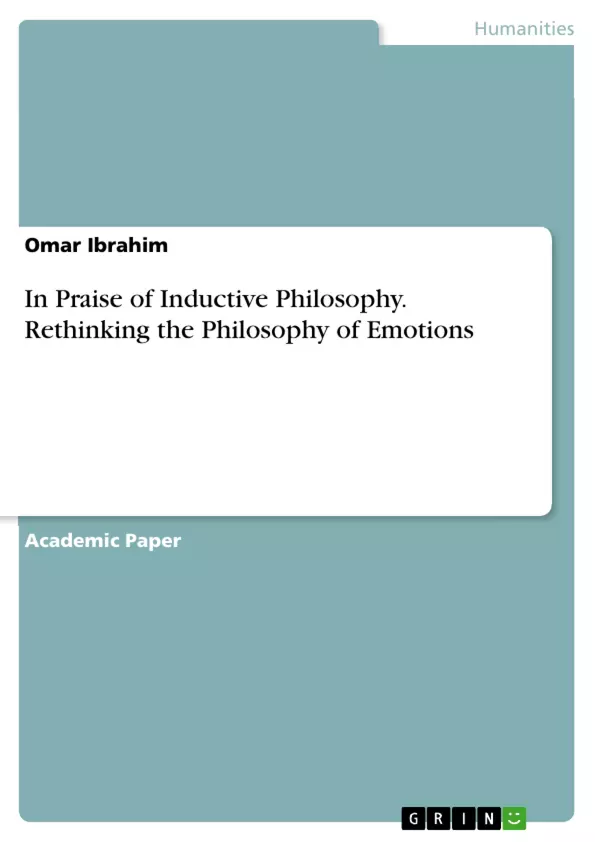The present study deals with the philosophy of emotions. In a brief discourse overview, the different positions are presented and their problems are examined. Subsequently, a new method is presented of how emotions can be investigated within the analytical tradition. In doing so, an attempt is made to build a bridge to the continental tradition and to integrate the latest findings from complexity research and the philosophy of language.
Do human emotions exist and what is the nature of their existence? In view of these two questions, contemporary philosophical debates on human emotions attempt to provide different answers. Mostly we find two prominently represented positions, which, however, cannot produce satisfactory answers at all. The first position, as I will call it in this paper, is the one of the deductionists. These scientists, psychologists and philosophers bring out a positive answer to the two questions presented above. They claim that human emotions really exist, in one way or another, and that they have a specific nature so that we can decipher and analyze them. A very famous example of this is Ekman's basic emotion theory, which presents a categorized system of six to seven basic emotions and describes their bio-psychological function. In the focus of the nature of emotions (what makes something an emotion?) we find other relevant theories such as Nussbaum, James or Prinz. All of them claim in different ways what constitutes the essence of an emotion. For example, emotions could be cognitive judgments of values, or perceptions of bodily changes, or even perceptions of value attributes themselves. Despite of all the differences, all these theories share one thing in common. All of them believe that only one deducible theory of emotions is sufficient to explain their nature in all its complexity and precariousness. The fact that the deductionists face serious problems can be seen from the current philosophical discourse alone.
Inhaltsverzeichnis (Table of Contents)
- Introduction: A Wrong Methodological Approach
- Deductionism: the neglect of complexity
- Nihilism: the neglect of pertinence
- Toward an Inductive Philosophy: A Modest Attempt
- What's next?: The Future of Philosophy of Emotion
Zielsetzung und Themenschwerpunkte (Objectives and Key Themes)
This paper aims to introduce a new, inductive methodological approach to the philosophy of emotions, proposing a solution to the unsatisfactory positions of deductionists and nihilists. It argues that an inductive method is more effective in investigating human emotions than deductive systems.
- The limitations of deductive methods in understanding the complexity of human emotions
- The inadequacies of nihilism in dismissing the existence and nature of emotions
- The potential of an inductive approach to overcome the aporia of deductionism and nihilism
- The importance of considering individual experiences and cultural context in understanding emotions
- The need for a more nuanced and holistic approach to the philosophy of emotions
Zusammenfassung der Kapitel (Chapter Summaries)
- Introduction: A Wrong Methodological Approach: This chapter introduces the two prevailing positions in the philosophical debate on human emotions: deductionism and nihilism. It critiques the limitations of both positions and outlines the need for a new methodological approach.
- Deductionism: the neglect of complexity: This chapter focuses on the deductive method employed by the deductionists, arguing that it simplifies the complexity of human emotions by relying on pre-established definitions and assertions. It critiques the limitations of theories such as the appraisal theory and the embodiment theory.
- Nihilism: the neglect of pertinence: This chapter addresses the nihilist position, which denies the existence of emotions altogether. It argues that nihilism, despite its rejection of deductive methods, ultimately relies on a similar flawed argument structure.
Schlüsselwörter (Keywords)
The primary focus of this paper lies in the philosophical methodology of understanding human emotions. It critiques the limitations of deductionism and nihilism, highlighting the importance of considering individual experiences, cultural context, and the complexity of emotions. Key terms and concepts include: inductive philosophy, deductive method, philosophy of emotions, human emotions, complexity, nihilism, pertinence, individual experience, cultural context.
Frequently Asked Questions
What is "Inductive Philosophy" in the context of emotions?
It is a methodological approach that investigates emotions based on individual experience and complexity, rather than relying on pre-set deductive definitions.
What is the main critique of "Deductionists"?
Deductionists are criticized for trying to explain the nature of all emotions through a single deducible theory, which often neglects their inherent complexity.
How does the paper view Ekman's basic emotion theory?
It is cited as a famous example of the deductive approach, categorizing emotions into a fixed system that may not capture the full spectrum of human feeling.
What is the "Nihilist" position on emotions?
Nihilists tend to dismiss the specific nature or even the existence of emotions as definable categories, which the paper argues neglects their pertinence.
How does the study integrate complexity research?
The study builds a bridge between analytical and continental traditions by using findings from complexity research and philosophy of language to understand emotional nuances.
- Citar trabajo
- Omar Ibrahim (Autor), 2019, In Praise of Inductive Philosophy. Rethinking the Philosophy of Emotions, Múnich, GRIN Verlag, https://www.grin.com/document/515314



